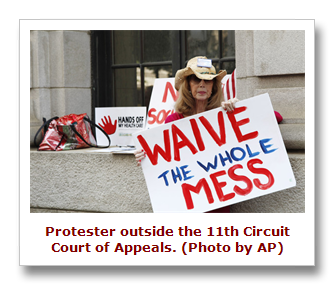Eleventh Circuit Court of Appeals hands Obamacare major setback
Friday the 11th Circuit Court of Appeals handed the Obama administration a demoralizing setback by ruling that the President’s national health care reform law’s mandate that Americans buy health insurance was unconstitutional, setting the scene for a landmark decision in the Supreme Court.
The opinion, jointly written by judges Joel Dubina and Frank Hull, said Congress had broad power to deal with the problems of the uninsured, "but what Congress cannot do…is mandate that individuals enter into contracts with private insurance companies for the purchase of an expensive product from the time they are born until the time they die."
In their 207 page majority opinion, the judges wrote, "The individual mandate is breathtaking in its expansive scope," two judges of the 11th Circuit Court of Appeals wrote in their 207-page majority opinion.
“Even during the Great Depression or World War II, Congress never sought to require the purchase of wheat or war bonds, force a higher savings rate or greater consumption of American goods. Though Congress may regulate those who buy insurance, it may not regulate those who have not entered the insurance market and have no intention of doing so."
The ruling directly contradicts another appellate ruling in June, setting the stage for the Supreme Court to step in before states expend millions of dollars implementing the law that might never be put into practice.
Ken Cuccinelli, Attorney General of the Commonwealth of Virginia, and leading advocate for invalidating of the law, said in response to the 11th Circuit Court decision:
"The court determined that the power to force one citizen to purchase a good or service from another is outside the established outer limits of both the ‘commerce clause’ and the ‘necessary and proper clause. The court also ruled that although the president and Congress want to now call the penalty a tax to make it pass constitutional muster, the penalty cannot be sustained under the federal government’s taxing authority because the penalty is not a tax."
In Article 1, Section 8 of the U.S. Constitution, the framers granted the federal government the power to regulate interstate commerce, however the clause itself allows great judicial latitude: “The congress of the United States shall have power…To regulate Commerce with foreign Nations, and among the several States, and with the Indian Tribes.” The Obama administration has argued that since the Commerce Clause gives Congress the power to regulate interstate commerce and most health insurance companies sell to businesses and individuals in multiple states, they can compel people to buy health insurance. But in the 11th Circuit’s opinion the judges responded that the Obama administration’s defense amounted to an argument that merely by existing, individuals affect interstate commerce, "and therefore Congress may regulate them at every point of their life."
Perhaps the most stunning result of the 11th Circuit Court’s ruling is that it was the first time a judge appointed by a Democratic had ruled part of Obamacare unconstitutional; Judge Hull was appointed by Bill Clinton.
Friday’s ruling, apart from earlier rulings in the Virginia lawsuit filed by Cuccinelli, comes as a result of the suit brought by governors and attorneys general from 26 states. With more than a majority of the states filing in opposition to the law, court watchers believe this is the case that will compel the Supreme Court to step in.
Not surprisingly, the Obama administration’s response was more of the same “Yes we can!” An advisor to the president released a statement saying, "We strongly disagree with this decision and we are confident it will not stand. Individuals who choose to go without health insurance are making an economic decision that affects all of us—when people without insurance obtain health care they cannot pay for, those with insurance and taxpayers are often left to pick up the tab."
While the 11th Circuit Court’s decision affirmed part of a January ruling by Florida U.S. District Judge Roger Vinson, they overruled Vinson on whether the entire law must be struck down or only the individual-mandate. Vinson voided the entire law, this decision said other provisions should stay "legally operative."
If the Supreme Court agrees with leaving the law in place, minus the mandate, far greater problems might surface as other parts of the law require health insurers to accept all prospective customers, even those seriously ill. When the law was written, insurance companies climbed on board because millions of new customers, mandated by the law, would offset the pre-existing condition coverage mandate. Without the mandate, insurance companies will be required to hike premiums to current clients, potentially leading to even fewer covered people.
The federal appellate courts in the District of Columbia and the Fourth Circuit Court of Appeals in Richmond, Virginia are expected to rule in the near future and given the make-up of these soon.
The Obama administration’s priority now is to delay the matter reaching the Supreme Court prior to the 2012 election. The D.C. appellate court will hear arguments in September, which could put the issue before the Supreme Court in their next term, which ends June 2012, right in the middle of the election. The court could hold off until the following term, which would postpone final resolution until after the November 2012 presidential election.
Ultimately Obamacare will land on the legislative trash heap, where all laws which grant the government control over the lives of its citizens belong. The Obama administration’s arguments supporting Congress’s power to oblige citizens to buy a service or product are without constitutional support and ultimately the Supreme Court will invalidate the law. Sadly millions of dollars of taxpayer’s money will be cast to the wind as states prepare for a law that will never be implemented and the opportunity to craft meaningful health care reform will be lost forever.

